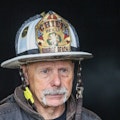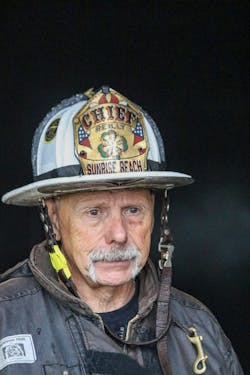Making the Emergency Scene Work—Part 2: What Chiefs Should Expect from Their Company Officers
Editor's Note: This is Part 2 of a two-part series from Dennis Reilly. Part 1 can be found here.
I would venture to say that we all agree that commanding any type of emergency is a daunting task. The need for personnel who operate at all levels to mesh seamlessly into a cohesive team is critical operational effectiveness. There can be no exceptions or excuses. My experience tells me that the company officer is absolutely the crucial link in making the emergency scene work.
First and foremost, company officers must bring skilled, competent companies to the emergency scene. Engine companies must be capable of generating and delivering effective fire streams. Ladder companies must be capable of venting all types of buildings. Specialty companies, such as rescue companies and squads, must be masters of multiple skills. Everyone must be able to function in the RIT capacity.
The company officer’s job is to make sure that companies are trained and capable. As a chief, I don’t want to hear, “Well, Chief, we just don’t pull that skid load all that often, and that’s why we had trouble at that apartment” or “Wow, we never reverse out, and my driver wasn’t sure about what to do.” The strength of a company is absolutely its officer’s responsibility. If there’s a skill about which the capability of the company is in question, turn off the TV and go drill.
The playbook
Say what you want about procedures and guidelines, but they are there for a reason. Successful emergency operations have some elements in common. One of them is that they are, to an extent, policy-driven. I don’t believe that a written document can answer all of the questions and solve all of the problems that the first-arriving company will encounter at, let’s say, 3:00 a.m., but I have been around long enough to know that good company officers and good firefighters take the initiative and make good things happen. I also know that every winning team works off of some type of playbook. I put guidelines in place to help our officers, to give us some type of predetermined battle rhythm, and to ensure consistency of operations no matter what day or time that the emergency occurs.
Officers, learn your playbook and execute as you are expected. If there are problems with your guidelines, craft a well-written explanation of them and suggest modifications that will fix the problems. I can tell you that when you do this, most professional chief officers will thank you for making their life better.
Discipline & compliance
A disciplined company is an asset, and an undisciplined company is a liability. Which one of these is what the company officer allows?
I don’t need to be walking around the fireground telling firefighters to put on their gloves. I don’t need to be spending time fixing mistakes because an officer didn’t follow the arrival sequence guidelines.
Disciplined companies make all of the difference in the world. Company officers must look at things not just from their perspective but from that of their chief, too. They should ask their chief the simple question, “How important is it for you to have disciplined companies on the emergency?” We all know what the chief will say, so why not start to build that quality within the company?
I saw a great example of discipline in a video from the Oxnard, CA, Fire Department. Several years ago, companies were engaged in a very aggressive offensive attack at a commercial building. It appears from the video that the companies were engaged for a bit, and I assume that the primary search was completed. It becomes obvious that conditions deteriorate, and the incident commander orders everyone out and a transition to a defensive attack. The interior operations stop immediately—let me repeat that, immediately—and all of the members exit the building and perform the personnel accountability report. There is no, “Hey, Chief, just give me another minute” on the radio. Companies follow orders when they are given.
When I give an order, I need compliance, not a debate. There’s a good chance that I will see things going in a direction that can endanger the members. If we must hash out what happened later, so be it. If there are questions about a decision, ask them during the post-incident analysis or the tailboard talk. The fireground isn’t a democracy, and for me to be able to do my job, I must have faith in my officers that they will execute as instructed.
Consistency
Another important element that company officers must consider is the consistency of operations.
Chiefs want consistency among their forces. Is your company the same company when you are off?
If your organization uses float or relief officers, you might not have a lot of control over who fills the officer position when you aren’t there. No matter, your people should operate the same regardless of who’s in charge.
If your relief is an acting officer from your company, you have the control. Train your replacement. Make sure that person understands what good behaviors look like and can make this happen.
We can’t schedule emergency events. The well-run company works just as well with an acting officer as it does with its regular officer.
Obligation to report flaws
I always look for my company officers to be an extra set of eyes and ears for me. They often are in the position to see what direction an operation is headed and whether the plan is working.
Officers must be able to communicate in clear and concise terms regarding the effectiveness of the strategic plan. If my plan is flawed, tell me. I don’t know many chiefs who look forward to failing. I don’t know many chiefs who like to burn down buildings. We are operating as a team, so if things aren’t working, then communicate that ASAP. The sooner that we can correct things, the sooner that we can get back on the winning track.
Credibility & trust
All of the things that are noted above are pieces of the puzzle, and it’s very important for company officers to understand that this isn’t the buffet line. You can’t just pick what you like and ignore what you don’t. The ability to do all of these things is what gives you credibility with your chief. The good officers, who in turn have good companies, understand that credibility is the building block of trust, and trust is what carries the day.
My final word is a challenge to those who say, “Don’t worry, Chief, we are all in when the bells hit.” If you aren’t living a disciplined life and doing all of the things that are noted above before the bells hit, you won’t be the superstar on the emergency scene.
Being a good company officer and having a good company is a full-time job. What you are on the emergency scene is exactly what you are in the firehouse. As a chief, I expect officers to understand that and to make the most of their time at the station.
Officers, train your folks and instill in them a passion for training. Review your guidelines on a regular basis, so there are no questions on game day.
If you make all of the things that are covered above part of the way that you operate, your company will be the one that the chief prays will show up at the nasty jobs.
About the Author

Dennis Reilly
Dennis Reilly is a 48-year fire service veteran and retired fire chief and is the owner of The First Line Fire Service Training Company. Reilly served as the fire chief in Pittsburg, KS, and Sunrise Beach, MO, and as an assistant in North Carolina and California and retired as a battalion chief in Cherry Hill, NJ. He was an original member of New Jersey Urban Search and Rescue Task Force 1. Reilly holds a master’s degree in public administration from Penn State University and is a CFO. He has spoken at numerous events, including the Command Officer Boot Camp and the Orlando Fire Conference. Reilly is a U.S. Army veteran who served in Iraq during the Operation Desert Storm.
